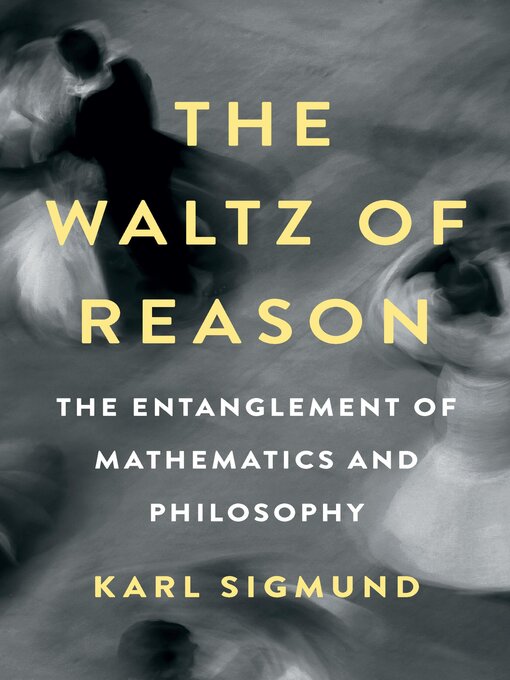- Popular Magazines
- Just Added
- Cooking & Food
- Fashion
- Health & Fitness
- Home & Garden
- News & Politics
- See all magazines collections
“Let no one ignorant of geometry enter here,” Plato warned would-be philosophers. Mathematician Karl Sigmund agrees.
In The Waltz of Reason, he shows how mathematics and philosophy together have shaped our understanding of space, chance, logic, cooperation, voting, and the social contract. Sigmund shows how game theory is integral to moral philosophy, how statistics shaped the meaning of reason, and how the search for a logical basis for math leads to deep questions about the nature of truth itself. But this is no dry tome: Sigmund’s wit and humor shine as brightly as his erudition.
The Waltz of Reason is an engrossing history of ideas as vibrant as a ballroom full of dancers, one that empowers as it entertains, following the complex and occasionally dizzying steps of the thinkers who have molded our thought and founded our world.
-
Creators
-
Publisher
-
Release date
December 19, 2023 -
Formats
-
Kindle Book
-
OverDrive Read
- ISBN: 9781541602700
-
EPUB ebook
- ISBN: 9781541602700
- File size: 64076 KB
-
-
Languages
- English
-
Reviews
-
Kirkus
October 15, 2023
Philosophers and mathematicians don't have much in common, right? A mathematician disagrees. Sigmund, professor emeritus of mathematics at the University of Vienna and author of Exact Thinking in Demented Times, makes his case in nearly 400 pages of lucid prose. The author is a fine writer, but this is not Mathematics and Philosophy for Dummies; readers without a background in both may struggle. The first section "traces the evolution of the self-image of mathematics." Evidence alone supports scientific laws; they can never be proven beyond a doubt. Not so with mathematics, but Sigmund's explanations of mathematical proofs--dense with equations and diagrams--are not for the faint of heart. Surprisingly, proving that 1 + 1 = 2 is a complex operation. In the second section of the book, the author deals with chance, the continuum, and infinity, which goes beyond common sense and often vexes philosophers with problems such as "how an infinitesimal could be smaller than anything and yet not zero." Beginning with the Enlightenment, mathematicians began stepping on philosophical toes by examining human behavior and institutions with often intriguing results. These occupy the book's third and fourth sections and are more accessible. In the digital age, computers are the rage even for deep thinkers, and it's become so difficult to maintain that computers are not intelligent that experts have moved the goalposts to maintain that they are not conscious. It turns out that humans are "utterly inept" at estimating probabilities, risks, and even fairness. Many Americans have no doubt that our winner-take-all voting system is superior, but it's proven that all voting systems are unfair. Sigmund also examines irresistible areas such as game theory, probability, decisions, and the social contract, as well as parables such as the Prisoner's Dilemma. Sigmund delves into fascinating philosophical areas but delivers an overwhelming amount of information.COPYRIGHT(2023) Kirkus Reviews, ALL RIGHTS RESERVED.
-
Publisher's Weekly
November 6, 2023
Sigmund (Games of Life), a professor emeritus of mathematics at the University of Vienna, explores in this spirited study the ways that math has been used to make sense of the world, from abstract controversies over logic to practical insights into elections and ethics. After overviewing concepts in computation, logic, chance, and causality, the author delves into “practical philosophy: morality and economics, politics and the law.” He identifies the intrinsic flaws of ranked voting systems (according to mathematician Ken Arrow’s impossibility theorem, no such system “can satisfy even the most reasonable” fair voting requirements, “as soon as there is a choice between more than two alternatives”) and the complexities of social cooperation as captured by the famous “prisoner’s dilemma” non-zero-sum game. Elsewhere, Sigmund traces evolving perceptions of math’s practical possibilities: as recently as 1940, some mathematicians were sure that general relativity and number theory refused “all possible applications,” but today “Einstein’s field equations are used in GPS, and number theory in all email platforms.” Wading into rich debates over math’s fundamental nature (Is math like a language? Does it have an existence independent of consciousness, or is it a purely mental construct?), Sigmund takes readers on a mind-bending jaunt through game theory, gambling systems, and more. This makes clear in fascinating detail how math is more than a sum of its parts.
-
Formats
- Kindle Book
- OverDrive Read
- EPUB ebook
subjects
Languages
- English
Loading
Why is availability limited?
×Availability can change throughout the month based on the library's budget. You can still place a hold on the title, and your hold will be automatically filled as soon as the title is available again.
The Kindle Book format for this title is not supported on:
×Read-along ebook
×The OverDrive Read format of this ebook has professional narration that plays while you read in your browser. Learn more here.


